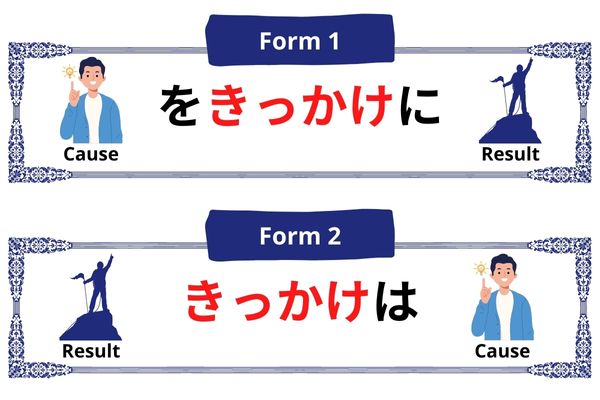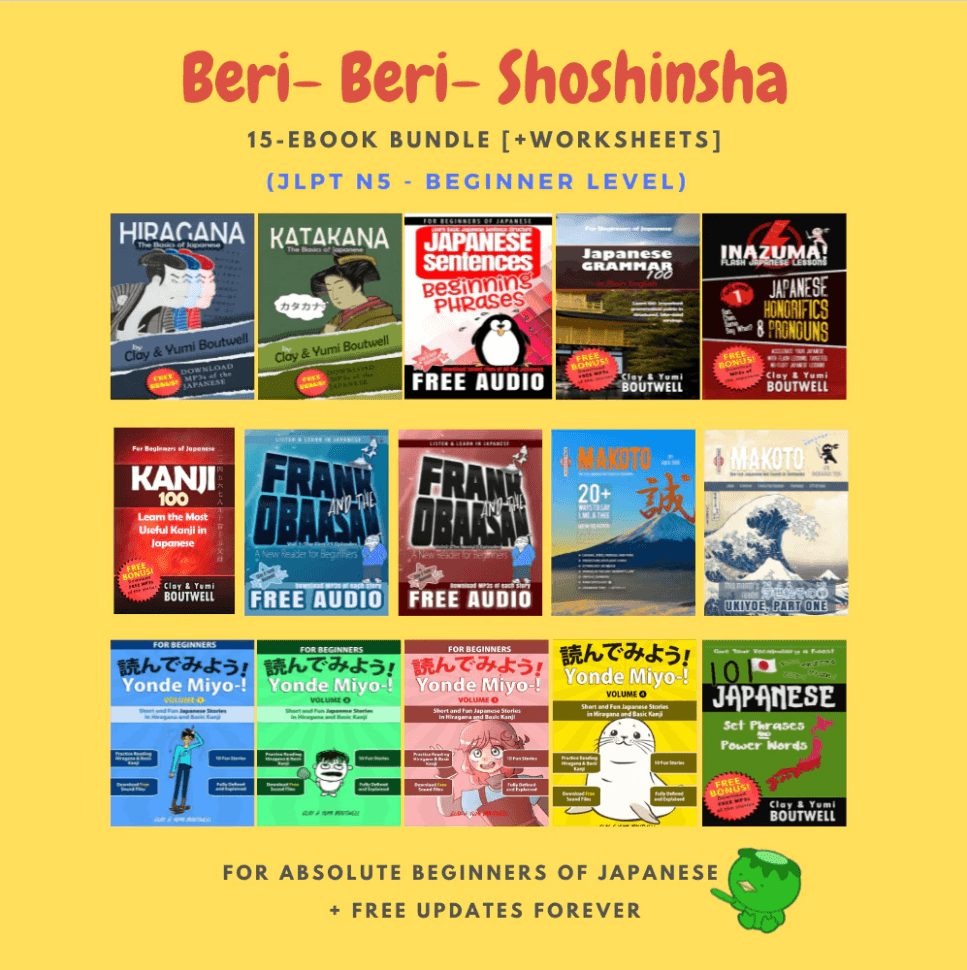きっかけ means a chance; start; cue; motive; impetus; occasion; trigger
That's not difficult to grasp, but... using it correctly can be a challenge.

If you are a Makoto+ member, please click here to download this lesson as a PDF, all the sound files, and an Anki flashcard deck with sound. Not a member? Click here to learn more.
きっかけ
きっかけ means a chance; start; cue; motive; impetus; occasion; trigger
It shows the causal relationship between a current state and some event or reason for the state.
The cause or motive.
"It all started when..." or "the event that led to..."
While the meaning of きっかけ may not be hard to grasp, words like this can be hard to use naturally and with proper grammar. I suggest memorizing 1-2 example sentences and plug and play other vocabulary for practice.
A common question for learners of Japanese might be:
何がきっかけで日本語の勉強を始めましたか?
This might be translated as:
- "What motivated you to study Japanese?"
- "What was your reason for learning Japanese?"
- or "What prompted you to study Japanese?"
The Kanji
Normally, this is written in hiragana, but the kanji is: 切っ掛け
切
Kanji Parts: 匕 (spoon (or could be considered “seven”)) + 刀 (blade; sword)
Meanings: cut; cutoff; be sharp
Kun: き・る
On: セツ、 サイ
掛
Kanji Parts: 扌 (hand) + 土 (earth; dirt) + 卜 (fortune-telling)
Meanings: hang; suspend; depend; arrive at
Kun: か・ける、か・かり
On: カイ、 ケイ
This may have come from the fact that one begins using most material (cloth, for example) by cutting or dividing into usable parts. Later, this came to mean the beginning cause for just about anything.
Grammatical Forms
There are two main grammatical forms we'll look at, and to make it easier to grasp, we'll give the same examples for each form.
Form 1: [cause or motive] をきっかけに (or をきっかけとして) [result or action]
Form 2: [result or action] きっかけは [cause or motive]

Basically, both forms mean the same thing, but the order of cause and effect is reversed.
Form 1: [cause or motive] をきっかけに (or をきっかけとして) [result or action]
日本の旅行をきっかけに日本語に興味が湧きました。
A trip to Japan sparked my interested in Japanese.
Form 2: [result or action] きっかけは [cause or motive]
日本語に興味が湧いたきっかけは、日本の旅行でした。
My interest in the Japanese language began with a trip to Japan.
Vocabulary:
- 日本 Japan
- の (limits the “trip” to that of “Japan”)
- 旅行 trip; travel
- を (sets “trip to Japan” as direct object of かっかけ)
- きっかけ sparked; began; it all started with
- 日本語に with Japanese language
- 興味が湧きましたintrigued; became interested in [興味 (interest in something; curiosity; zest for) + 湧く (to well up; to gush forth; to spring out; to surge)]
More Examples
何がきっかけで日本語の勉強を始めましたか?
What prompted you to start studying Japanese?
Form 1:
アニメをきっかけにして日本語を習い始めました。
It was anime that inspired me to start learning Japanese.
Form 2:
日本語を習い始めたきっかけはアニメでした。
I started learning Japanese because of anime.
Vocabulary:
- 何がきっかけで what was the reason
- 日本語の勉強 Japanese studying
- 始めました began
- アニメ anime
- きっかけにして was the reason behind
- 習い始めました began to learn
Form 1:
結婚をきっかけに、新しい家を買った。
When I got married, I bought a new house.
Form 2:
新しい家を買ったきっかけは結婚だった。
The impetus for buying a new house was marriage.
Vocabulary:
- 結婚 marriage
- をきっかけに sparked; because of (marriage)
- 新しい new
- 家 house
- 買った bought [simple past of 買う (to buy)]
- だった was
Form 1:
出産をきっかけに仕事を辞めました。
After giving birth, I quit my job.
Form 2:
仕事を辞めたきっかけは、出産でした。
The reason I quit my job was the birth of my child.
Vocabulary:
- 出産 giving birth
- をきっかけに the reason
- 仕事 work
- 辞めました quit (work)
- でした was
Form 1:
先生の一言がきっかけで留学をした。
A word from his teacher inspired (me) to study abroad.
Form 2:
留学をしたきっかけは先生の一言だった。
The reason I studied abroad was a comment from a teacher.
Vocabulary:
- 先生 teacher
- の (limits the "one word" to that of the teacher)
- 一言 one word; a few words; brief comment
- がきっかけで due to; sparked
- 留学をした studied abroad
きっかけ can be a little tricky to use naturally. Spend a few minutes repeating and memorizing an example sentence. Then try substituting words to express the idea in new contexts.

If you are a Makoto+ member, please click here to download this lesson as a PDF, all the sound files, and an Anki flashcard deck with sound. Not a member? Click here to learn more.






There are actually 3 forms: 〜がきかっけで, 〜をきかっけに and 〜きかっかは. You used all of them but explained only two.
With 〜がきっかけで the subject of the sentence is the cause itself. The cause leads to a certain result. You used 〜がきっかけで in your questions, because question pronouns like 何 usually take が, and of course, you were asking for the reason.
With 〜をきっかけに, the focus is on the object of the sentence, which is used as a cause for a volitional action by the subject (eg. speaker).